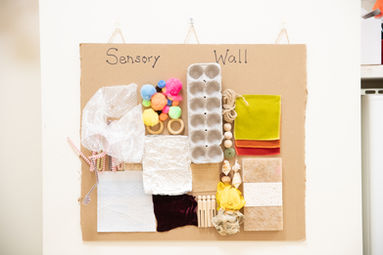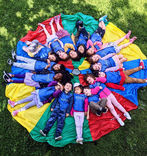Reggio Emilia
Approach
''Creativity seems to emerge from multiple experiences, coupled with a well-supported development of personal resources, including a sense of freedom to venture beyond the known.''
Loris Malaguzzi
The Reggio Emilia Approach® is an educational philosophy based on the image of a child with strong potentialities for development and a subject with rights, who learns through the hundred languages belonging to all human beings, and grows in relations with others. At BunnyHill, classroom curriculum is built upon the interests of the children and the observations of the teachers. Children and teachers explore content in meaningful ways, through multiple representations. Varied presentations and expressive media afford all children the opportunity to understand and connect with the themes and content. The classroom environment is viewed as the third teacher, supporting student learning and adapting to meet the needs of our learners. BunnyHill is a community, committed to providing the highest quality learning experiences and encounters for our children, teachers, and parents.

Aesthetic Appreciation
Helping children understand the world around them plays a key role in early childhood development. Children not only need to be taught the core subjects, but they need to learn an appreciation for the arts.

Gross Motor Skills
Gross motor skills involve the larger muscles in the arms, legs and torso. Gross motor activities include walking, running, throwing, lifting, kicking, etc. These skills also relate to body awareness, reaction speed, balance and strength.
.jpeg)
Social Emotional Learning
Emotional well-being during the early years has a powerful impact on social relationships. Children who are emotionally healthy are better able to establish and maintain positive relationships with adults as well as with peers. Social-emotional development is essential to a young child’s sense of well-being.

Fine Motor Skills
Generally thought of as the movement and use of hands and upper extremities, fine motor skills include reaching, grasping and manipulating objects with your hands.

Experimentation
Cause and Effect
Starting around eight months of age, children perform simple actions to make things happen, notice the relationships between events, and notice the effects of others on the immediate environment.
.jpeg)
Receptive Language
As children develop, they learn to listen and understand language. It involves understanding the words, sentences and meaning of what others say or what is read.

Expressive Language
As children develop, they learn to speak and use language. They will be able to put thoughts into words and sentences, in a way that makes sense and is grammatically accurate.

Numeracy and Mathematical Concepts
Children start learning numeracy skills from the time they're born. It includes Observation, Problem Solving, Language, One-to-One Correspondence, Number Sense, Shapes, Spatial Sense, Sets and Classifying and so much more.
_PNG.png)







